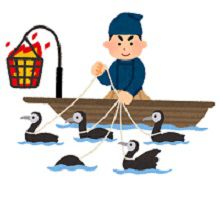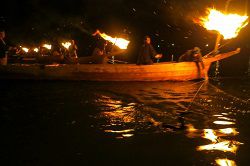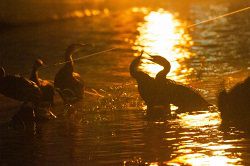This traditional style of fishing
There are some traditional methods of doing things in Japan that are also tourist draws. This traditional style of fishing is one of those.
Here Yamamoto sensei takes a little time to introduce this fascinating culture.
鵜飼
Cormorant Fishing

By YAMAMOTO Hiroshi

今週は「鵜飼」を紹介します。
鵜飼とは鵜という水鳥を使ってアユという魚をとる方法です。 1300年以上前から行われています。 毎年5月11日より、日本で最も有名な鵜飼である長良川の漁が始まり、秋まで続きます。
木の船に、昔風の服を着た漁師が乗ります。 漁師は、魚を捕る訓練を受けた水鳥にひもを付けて、川に泳がせます。 船は夜、手でこいで川に出て、かがり火を点けます。 そのかがり火に魚が驚いて、水面に出てきます。

水鳥がその魚を見つけて、飲み込もうとします。 しかし、水鳥ののどにはゆるくひもが結ばれており、大きなサイズの魚は飲み込むことができません。 小さな魚は食べることができます。 漁師は船の上で、その大きな魚を水鳥から吐き出させて、魚を獲ります。

また、多くの観光客がその昔ながらの漁の様子を見ようと、集まって来ます。
水鳥を使って魚を獲るって、おもしろいですね。 水鳥もその日の漁が終わると、バイト代として大きな魚をもらうそうです。
To listen to this blog, please watch our Youtube video.
鵜飼(うかい)
今週は「鵜飼(うかい)」 を紹介(しょうかい)します。
鵜飼とは鵜(う)という水鳥(みずとり)を使ってアユという魚(さかな)をとる方法(ほうほう)です。1300年以上(いじょう)前(まえ)から行(おこな)われています。 毎年(まいとし)5月11日より、日本で最(もっと)も有名(ゆうめい)な鵜飼(うかい)である長良川(ながらがわ)の漁(りょう)が始まり、秋(あき)まで続(つづ)きます。
木(き)の船(ふね)に、昔風(むかしふう)の服(ふく)を着(き)た漁師(りょうし)が乗ります。 漁師は、魚を捕(と)る訓練(くんれん)を受けた水鳥にひもを付けて、川に泳(およ)がせます。 船(ふね)は夜(よる)、手(て)でこいで川(かわ)に出(で)て、かがり火を点(つ)けます。
そのかがり火に魚(さかな)が驚(おどろ)いて、水面(すいめん)に出てきます。 水鳥がその魚を見つけて、飲(の)み込(こ)もうとします。 しかし、水鳥ののどにはゆるくひもが結(むす)ばれており、大きなサイズの魚は飲(の)み込(こ)むことができません。小さな魚は食べることができます。 漁師(りょうし)は船の上で、その大きな魚を水鳥から吐(は)き出させて、魚を獲(と)ります。
また、多(おお)くの観光客(かんこうきゃく)がその昔(むかし)ながらの漁の様子(ようす)を見ようと、集(あつ)まって来ます。
水鳥を使って魚を獲(と)るって、おもしろいですね。 水鳥もその日の漁が終(お)わると、バイト代(だい)として大(おお)きな魚をもらうそうです。
Cormorant Fishing
This week we introduce Cormorant Fishing.
Cormorant fishing is a method of using water birds called cormorants to catch fish called ayu. It has been practiced for more than 1,300 years. Fishing on the Nagara River, the most famous cormorant fishery in Japan, begins on 11 May every year and lasts until autumn.
Wooden boats are boarded by fishermen dressed in old-fashioned clothes. Fishermen tether up cormorants trained to catch fish and let them swim in the river. The boat is hand-pulled out into the river at night and a fire is lit in an iron basket.
The fish are startled by the fire and come to the surface. The cormorants spot the fish and try to swallow them. However, the cormorants' necks are loosely bound, preventing them from swallowing the larger fish. Smaller fish can be eaten. Fishermen catch the fish on their boats by expelling the large fish from the cormorants.
Many tourists also come to watch the traditional fishing. Catching fish using cormorants is interesting.
After the day's fishing is finished, the waterfowl also receive a big fish as payment for their work.
鵜飼(うかい)」cormorant fishing
鵜(う)cormorant
水鳥(みずとり) water bird
アユ a type of sweet fish
漁(りょう) fishing
漁師(りょうし)fisherman
かがり火 fire built in an iron basket

I started teaching Japanese to technical intern trainees and internship students, and since 2019, online Japanese instructor at JOI.
My main focus is on Business Japanese and JLPT grammar (N1,N2.N3) in particular. I am also available for short-term private lessons to improve your business Japanese skills before joining a company, taking an assignment, or changing jobs on your requested schedule.
I worked for a major machine manufacturer for about 40 years. During that time, I was assigned to various departments such as factories, trading, R&D, sales, general affairs, accounting, and auditing. With these experiences, I believe I can provide you with practical assistance in various situations when you are doing business in Japanese.